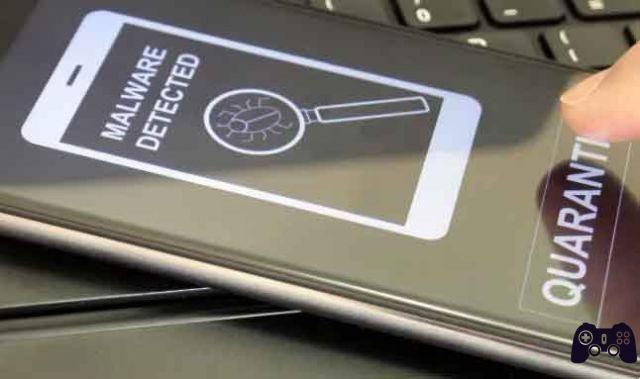
More tips to prevent this from happening. Our smartphones are incredibly personal devices. With access to almost all the information any criminal could want. This is why phone theft is a huge privacy concern.
However, you don't need to physically lose your phone to steal all your juicy data. Hackers have various ways to spy on your phone or take complete control of it. They don't always blatantly do this, so you'll have to keep your eyes peeled for various strange symptoms that may indicate that your Android device has been hacked. Here's how to tell if your Android has been hacked.
The phone is slow and the battery drains too quickly
All Android phones tend to slow down and lose battery capacity over time. However, this doesn't happen overnight. When your phone gets infected with malware that sends information on behalf of the hacker, you will often notice a significant drop in battery life.
In this situation, your phone may be slow to respond and always feel warm to the touch, even though you may not have used it for a while. This isn't conclusive evidence of hacking, but a phone that suddenly takes a nosedive in performance and battery life definitely has something wrong with it. So it's worth checking for malware.
Your data inexplicably disappears
While some people are lucky enough to have unlimited mobile data packages, most people have a limited data plan. If you suddenly find yourself running out of data faster than usual, it could be a sign that your Android has been hacked.
This is especially true if the hacker is watching you through your webcam! Even for those with no data limits, monthly data usage trends are worth checking out. A suspicious increase in monthly consumption could be a sign of hacking.
Weird and suspicious pop-ups
One obvious sign that many people may be ignoring are unusual pop-up ads or strange windows appearing on the screen. It is one thing to see malicious pop-ups containing spam in a mobile web browser, but it is absolutely not normal to find them anywhere outside of a web browser.
Compromised phones can generate pop-ups and alerts that appear to be coming from the operating system. These usually report something like your phone is infected with malware (technically true) and that you should click on a particular link to fix the problem. That link is a phishing attempt or will lead to the installation of even more malware.
App you've never seen before
Most Android users probably have an app drawer full of apps they've completely forgotten about. So this can be a difficult sign to spot. However, it's worth checking your app drawer from time to time to see if there are any weird apps you don't remember installing.
Changes to the browser home page
If you open your mobile device browser and are immediately redirected to a landing page that isn't the one you specified (or the default for your browser), that's a huge red flag. It means your browser has been hijacked!
This is bad on several levels. Not only could you be redirected to fake versions of real sites, but anything you type in your browser could also be looked at and captured. This includes sensitive information such as passwords!
Your phone makes calls or texts without your knowledge
It's always a good idea to check your call records at the end of each month. Whether it is to surprise your children while they are using your phone without your knowledge or to see if a hacker has made calls or sent messages from your phone for illegal purposes. If you notice any calls or messaging activity in your phone records that you haven't made, it's another sign that a particular phone may be compromised.
Your linked accounts go haywire
Smartphones usually have all of our online accounts linked to them. Be it banking, social media, email or online gaming. The information and login credentials are all there.
When a hacker takes control of your phone or starts spying on what you're doing, it's a gateway to your other accounts. If you see logins from strange places or warnings that your password has been reset, a compromised phone could be the source of the intrusion. This means that simply changing passwords will not be enough.
Get rid of hackers
So let's assume your phone is really compromised. What should you do? Here's what we suggest:
- First, put your phone in airplane mode and remove the SIM card and SD card if applicable.
- Perform a factory reset on your Android or iPhone. Warning, you will lose all data on your phone!
- Put the SD card into a card reader on your computer and scan it for malware.
- Remove any data (such as photos) you want to keep on the SD card, then format the SD card.
- Set up your phone from scratch, as if it were new.
- Replace the SIM card and SD card.
In most cases this should be enough to clean the phone of malware or viruses. However, there are forms of malware that can survive a factory reset. For example, xHelper can change the phone's read-only system partition.
While unlikely, if you find that your newly restored phone has been compromised again despite the precautions, you may need to run it again with a fresh copy of the latest firmware. The worst malware infections may require a complete phone replacement.
Tips to prevent phone hacking
If your phone is now malware-free or you want to prevent a hack first, here are some practical tips:
- Always use unique passwords for each online account you have.
- Use a password manager to generate strong passwords for your accounts.
- Always protect your phone with a passcode or some sort of screen lock.
- Don't root your phone or install apps from outside the official app store unless you understand the risks.
- Stay away from dangerous websites, usually those that advertise illegal or adult content.
- When using a public charging point, use a special power only cable that cannot carry data. Some virus infections can occur via USB.
- Avoid installing custom firmware on your phone unless you are 100% sure it has been verified as safe.
- Regularly review app permissions and security settings. Don't grant permissions for things like camera or location access to apps that don't need them to do their jobs. Uninstall apps that don't give you the option to disable these permissions.
These are just a few general tips. Your best defense is to be reasonable about what you do with your phone, where you take it, who has access to it, and what websites and software you interact with.
Do things seriously
Your smartphone is one of the most valuable items you own, and not just because it was expensive! These devices are at the center of our lives, contain virtually all of our information, and are always about us. When they are compromised, it is a serious and devastating problem. Keep this in mind whenever you wonder whether or not you should tap on that link or install a specific app. Is it worth risking the stakes?
Further Reading:
- How to know if your phone has been hacked
- How to block ads in apps on your Android phone
- What to do if your Instagram account has been hacked
- How to know if the smartphone has been intercepted
- Has your phone been hacked? Here's what to do next






